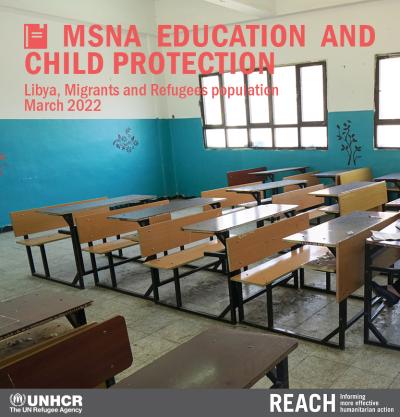Multi-Sector Needs Assessment (MSNA) Migrants and refugees in Libya: Education and Child Protection component
Since the onset of the conflict in Libya in 2011, access to education has been severely disrupted affecting thousands of children. The REACH multi-sector needs assessment of the migrant & refugee population found that 56% of households had education needs. 49% of assessed Libyan migrant & refugee households reported having at least 1 child not enrolled in school or any children not enrolled in formal school. The most cited reasons for dropout & non-enrolment were lack of documentation + education expenses. Amongst the assessed migrant and refugee households in Libya, 23% reported having at least one child working outside the house. 32% of respondents reported being aware of children who had experienced safety/security incidents in their municipalities.
Data on education and child protection needs of refugee and migrant children in Libya, however, remains limited. In the light of this information gap and within the framework of the 2021 Refugee and Migrants MSNA, the United Nations High Commissioner for Refugees(UNHCR) and the UN Office for the Coordination of Humanitarian Affairs (OCHA), with support from REACH and extensive input from the Libya Education Sector, the Child Protection Working Group (WG) and the Mental Health and Psychosocial Support Working Group (MHPSS WG), conducted a dedicated data collection exercise on education and child protection in 9 mantikas in Libya. This study aimed to complement the migrants and refugees MSNA by providing up-to-date information on education and child protection needs of refugee and migrant children in Libya.




